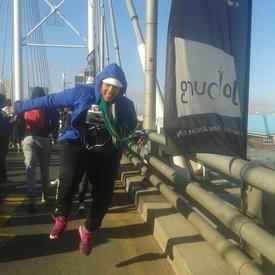Distance running + heavy lifting....

gashinshotan
Posts: 749 Member
So I lost 30 lbs through distance running but I've plateaued and decided that I would start lifting again today..... except I seemed to have lost a lot of strength (incline bench down 130 from 180 for reps when I began losing weight and stopped lifting)... will my running hinder muscle gain that much (20-30 miles a week). My goal is to get cut and I am eating 1600-1800 Cal's a day with one or two.cheat days a week. Also, should I take creatine or avoid it? I don't want to lose my endurance at all (my current longest run was 13.5 miles which is my best EVER)
0
Replies
-
I gained 15lbs training for a marathon. No special supplements required.0
-
seriously though with endurance running your body holds on to stuff. you would think its easier to loose that way. be careful you might be depleting too much depending on what you are doing, make sure you replace enough!0
-
You almost have to choose whether it is weight loss or strength gains that you have as a goal. I run distances and lift weights. I have to eat a lot of protein to accomplish it. I've been able to do both by worrying more about my strength than my weight. There is no conflict with running distance and weight training if you eat enough calories (fuel) to do both. Endurance and strength are my two main goals. I had to switch to that after my first goal was weight loss. I hope my experience helps you in your decision making process.0
-
I'm dealing with the same issue.
Distance running and muscle bulk present a natural conflict. Long distance running will consume muscle just as much as glucose and fat. Look at any elite level marathoner... they lack muscle mass. Endurance events cry for a lean body for efficiency.
Personally, I've been hitting the weights heavy while backing off of the mileage. Once I begin to add more muscle, I will go back to higher reps to coincide with increasing mileage. I understand that higher reps are better conducive for distance running.
I zig-zag my calories so that some days there will be a surplus for adding muscle, and some days I stay under to hopefully burn mostly fat. It's all experimental for me though. I don't have much of network of lifting runners to learn from.
I can't help you with the Creatine question. good luck0 -
I do the c25k program with high interval sprints after it every second day, every day I do some weights I have different programs for different muscle groups so I can cycle through. I am very fortunate to have Adelle who works at my site as a Heath/gym guru she's the bomb and knows just how hard to push & challenge me, she's a great roll model.
My suggestion if your looking for direction on the weights front, find a trainer who's style appeals to you and ask em for a program
All my supplement questions I take to flush fitness on face book.
I want my endurance jogging/running and I want to have muscle as well, I don't see why I can have those goals and I refuse to acknowledge anyone who tells me I can't.0 -
Creatine will help you gain lean muscle which can be good in the end, for endurance. As far as running goes, they say it doesn't help with endurance--e.g., for energy, etc. I don't think you need to avoid it either. From what I've read, endurance runners are encouraged to strength train. I don't think running will hinder your muscle gain. Check out runnersworld.com, running times or active.com for more tips on running and wight trainning.0
-
~bump~0
-
bump0
-
Using elite marathoners as an example is pointless--they are genetically structured differently than 99% of the population and they actively try to avoid gaining muscle mass. It virtually zero relevance for the average person.
There are plenty of triathletes who do just as much endurance training as marathoners and they look just fine.
I lost 60 lb in 5 months. At my peak, I was averaging 800-1000 calories a day burned with aerobic exercise. At the same time I also gained 4lb-8lb of muscle and increased all my lifting weights by 60% to 80%. Average bodies react a lot differently to exercise training that elite bodies.
If you stopped lifting weights, then, yes, your weights will decrease. I injured my back pretty severely back in November and have only recently started lifting again. I have not been doing any distance running, but the weights I am lifting have also been dramatically reduced.
Running 25-30 miles a week is not that much -- I doubt it will inhibit your strength gains. Your relatively low calorie intake might, but not the running.0 -
I lost 30 lbs in 3 months and it appears that prob half of that was muscle... so I should get supercut right with 1600 cals a day and heavy lifting + the running...0
-
The problem is that you stopped lifting in order to run. If you stop using a muscle, it will lose strength. I run about 20-30 miles per week and lift heavy 2 - 3 times per week and have posted pretty steady gains in strength. The only time I've seen strength dip is either right after a race when my muscles are still fatigued or when I've stopped lifting for a while.
Extra protein will help your body hold on to the muscle it has, but you need to work the muscle as well.0 -
Heavy lifting and distance running are really only counteractive at the upper crust level of athletes in my opinion. The only thing I would suggest would be to make sure you don't do heavy lifting before a long run. I find creatine to be pointless to the average person, but that's just me. Also, how many calories are your cheat days roughly? 1600 calories a day seems low.0
-
Distance running and putting on muscle mass are pretty much mutually exclusive propositions to we mere mortals. Though your distances aren't significant enough to rule it out. If you are averaging 50 miles a week or higher, it would be tough. But then, if you are putting in that kind of mileage (or more), you aren't looking to do that since it would hinder your running! Many ultra runners do strength training because it will help their running to be stronger. But that doesn't equate to adding mass.
If you are a runner, I would avoid Creatine. You have to be careful with making sure you drink plenty of fluids with it, and if you are also running a lot, it's even more difficult. I just won't stress your kidneys like that. Plus, you lose whatever you get when you stop taking it.
Lastly, if you are looking to shed more fat, besides your running you need to add in some very high intensity exercises (e.g. Tabata's). Good luck!0 -
I jog 25-30 miles a week and lift heavy twice a week. I have had no issues with gaining strength. Now, I have not gained as much mass as I normally would...but I'm also not trying to bulk up. In fact, my bench press is stronger now than it has ever been. I eat anywhere from 1800-2500 calories a day (6'4, 212lb right now...down 25 lb from this time last year). I've found the combo of strength training and 25-30 miles a week to be perfect for my needs.0
-
As others have said... If you want to excel in either distance running or strength/building you will need to specialise. But if you re happy to be good in both, or at least above average,it is possible.
I lift and run. I strength train three days a week and run three days a week ( alternate days with a rest day per week). Every strength session includes squats and I push myself hard. I run between 15 and 25 miles per week over the three sessions. Im neither phenomenally strong or phenomenally fast but I'm ok in both respects.0 -
Using elite marathoners as an example is pointless--they are genetically structured differently than 99% of the population and they actively try to avoid gaining muscle mass. It virtually zero relevance for the average person.
There are plenty of triathletes who do just as much endurance training as marathoners and they look just fine.
I lost 60 lb in 5 months. At my peak, I was averaging 800-1000 calories a day burned with aerobic exercise. At the same time I also gained 4lb-8lb of muscle and increased all my lifting weights by 60% to 80%. Average bodies react a lot differently to exercise training that elite bodies.
If you stopped lifting weights, then, yes, your weights will decrease. I injured my back pretty severely back in November and have only recently started lifting again. I have not been doing any distance running, but the weights I am lifting have also been dramatically reduced.
Running 25-30 miles a week is not that much -- I doubt it will inhibit your strength gains. Your relatively low calorie intake might, but not the running.
I'm curious how you know how much muscle you gained while simultaneously losing fat.0 -
Bump0
-
bump0
-
Well after my chest day I already look significantly bigger according to someone who just saw me this past Sunday (believe it or not I'm a super-fast gainer, guess cuz im only 5'3").... but my running was weird - my HR was up 10-15 bpm over normal and I really felt fatigued the night of my first workout.... I still finished the run but it seemed as if my heart was working harder than normal - could it be from just my body recovering? I love the sore feeling though on my chest/abs cuz I know I got a good workout.0
-
Using elite marathoners as an example is pointless--they are genetically structured differently than 99% of the population and they actively try to avoid gaining muscle mass. It virtually zero relevance for the average person.
There are plenty of triathletes who do just as much endurance training as marathoners and they look just fine.
I lost 60 lb in 5 months. At my peak, I was averaging 800-1000 calories a day burned with aerobic exercise. At the same time I also gained 4lb-8lb of muscle and increased all my lifting weights by 60% to 80%. Average bodies react a lot differently to exercise training that elite bodies.
If you stopped lifting weights, then, yes, your weights will decrease. I injured my back pretty severely back in November and have only recently started lifting again. I have not been doing any distance running, but the weights I am lifting have also been dramatically reduced.
Running 25-30 miles a week is not that much -- I doubt it will inhibit your strength gains. Your relatively low calorie intake might, but not the running.
I'm curious how you know how much muscle you gained while simultaneously losing fat.
This is what I do for a living. I have lots of personal data that I am able to collect, plus I have 25-30 years worth of experience with my body and other historical measurements I can compare.0
This discussion has been closed.
Categories
- All Categories
- 1.4M Health, Wellness and Goals
- 394.1K Introduce Yourself
- 43.9K Getting Started
- 260.4K Health and Weight Loss
- 176.1K Food and Nutrition
- 47.5K Recipes
- 232.6K Fitness and Exercise
- 436 Sleep, Mindfulness and Overall Wellness
- 6.5K Goal: Maintaining Weight
- 8.6K Goal: Gaining Weight and Body Building
- 153.1K Motivation and Support
- 8.1K Challenges
- 1.3K Debate Club
- 96.4K Chit-Chat
- 2.5K Fun and Games
- 3.9K MyFitnessPal Information
- 15 News and Announcements
- 1.2K Feature Suggestions and Ideas
- 2.7K MyFitnessPal Tech Support Questions










